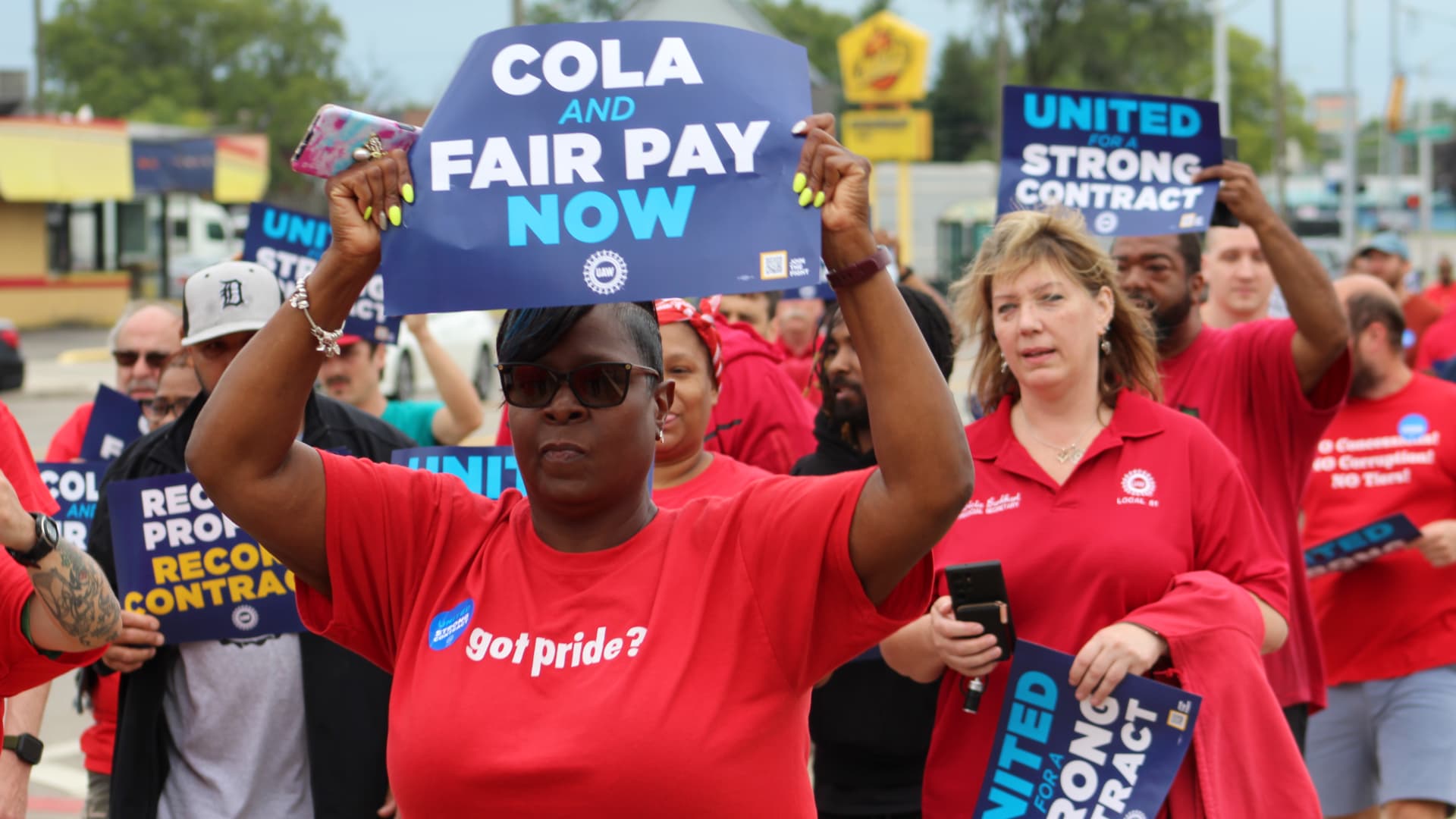The United Auto Workers (UAW) may employ a strategy similar to the 1998 strike if they decide to strike against the Detroit automakers next month, potentially causing serious damage to the industry by targeting key component plants or focusing on one automaker while striking at plants that produce its bestselling vehicles.
The United Auto Workers union is preparing for possible strikes at the nation’s three unionized automakers next month, as they seek to regain lost concessions and protect members during the transition to electric vehicles.
United Auto Workers members have overwhelmingly authorized a strike against General Motors, Ford Motor, and Stellantis during ongoing contract negotiations, with an average of 97% of members supporting the action, although the final votes are still being counted.
The United Auto Workers has filed unfair labor practice charges against General Motors and Stellantis for not bargaining in good faith, while also criticizing Ford Motor's counterproposal for including unfavorable terms.
The United Auto Workers union and three Detroit automakers are facing a looming strike as contract negotiations stall, potentially impacting the U.S. economy and the companies' profits amid the shift to electric vehicles and demands for improved wages and benefits.
United Auto Workers President Shawn Fain stated that the Detroit Three automakers, including Stellantis, Ford, and General Motors, are making progress towards meeting the union's demands as the deadline for current contracts approaches. Stellantis offered a 14.5% wage increase, Ford proposed a cost-of-living wage adjustment, and GM suggested a 10% boost, but the offers still fall short of the UAW's requested 46% increase.
Approximately 146,000 U.S. auto workers are poised to go on strike if General Motors, Ford, and Stellantis fail to meet their demands for substantial pay raises and restored benefits, potentially causing significant disruptions in auto production and impacting the U.S. economy.
Car dealerships are preparing for potential strikes by the United Auto Workers against Ford, General Motors, and Stellantis, which could lead to inventory shortages and higher prices for both new and used cars.
The local auto workers' union at Ford's Sharonville transmission plant is preparing for a potential strike as the contract between the United Auto Workers union and the Big Three automakers expires, with picketing instructions issued and workers standing strong behind negotiators.
The United Auto Workers union could potentially strike at Detroit's Big Three automakers if a deal isn't reached by the contract deadline, although progress is being made in the talks regarding wages.
The United Auto Workers union plans to implement targeted strikes at certain plants if tentative contracts are not reached with General Motors, Ford Motor, and Stellantis, potentially affecting local contract issues and involving work stoppages only at specific plants.
Ford CEO Jim Farley accuses United Auto Workers President Shawn Fain of not taking bargaining seriously and blames him for not showing up to negotiate, as they face a strike deadline.
Auto workers have initiated a series of strikes after failing to reach an agreement with the three largest US manufacturers over a new contract, marking a major industrial labor action and targeting all three Detroit carmakers simultaneously.
Shawn Fain, the head of the United Auto Workers, has taken a bold and risky approach to the labor strikes by representing nearly 150,000 auto workers and using social media, appearances on news programs, and alliances with progressive politicians to reframe the UAW's contract bargaining as a battle between workers and global corporations.
Investors shouldn't be worried about the impact of the strikes by United Auto Workers on Ford, GM, and Stellantis, as the lack of a significant reaction in stock prices suggests that the strikes have not been priced in and the market doesn't expect them to have a lasting impact on the economy.
UAW President Shawn Fain is injecting chaos into negotiations with striking autoworkers, implementing a unique strike strategy to maximize leverage and keep the automakers guessing, while also pressuring President Joe Biden by withholding the union's endorsement and criticizing his support.
The leader of the United Auto Workers, Shawn Fain, is frustrated with President Joe Biden and other Democratic lawmakers for not coming out more aggressively in support of his union during their strike against the Big Three automakers.
United Auto Workers President Shawn Fain rejected a 21% pay increase from Stellantis as nearly 13,000 auto workers continued their third day of picketing outside three plants in Michigan, Missouri, and Ohio.
UAW President Shawn Fain gives the Big Three automakers an ultimatum, stating that if they do not make substantial progress towards a fair agreement by Friday, September 22, more members will join the "stand up" strike.
The Canadian autoworkers' union, Unifor, has reached a tentative labor deal with Ford Motor Co., preventing a potential strike and potentially influencing the separate negotiations between the UAW and the Detroit Three in the United States.
The ongoing United Auto Workers strike against the Big Three automakers could result in gains for Tesla and foreign automakers as Ford, GM, and Stellantis face challenges in transitioning to electric vehicles and potentially raising prices, according to Wedbush analysts.
The United Auto Workers union is set to escalate their strike against the Big Three automakers in an effort to combat stagnant wages and other concessions, with UAW President Shawn Fain expected to announce which plants will join the strike next.
